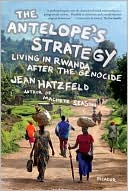

 |

|

The average rating for Antelope's Strategy: Living in Rwanda after the Genocide based on 2 reviews is 5 stars.
Review # 1 was written on 2018-07-06 00:00:00 Pierre Menard Pierre MenardNote: This review is for the full four-part series. French reporter and longtime resident of the African continent, Jean Hatzfeld, documents the Rwandan Genocide in more detail than any other historian or journalist. But don't look to his series for a complete historical context or a full examination of the motives of the killers or the previous crimes of the Tutsi people and the colonialists. Other books, like Philip Gourevitch's excellent We Wish to Inform You That Tomorrow We Will Be Killed with Our Families informs and educates the reader more thoroughly on context, motivation, and history. Hatzfeld instead offers direct contact with the killers and the survivors. He tracks life in one small village as it progresses over 24 years from the 100 days of the "cuttings" of the genocide, through the forced return and imprisonment of the escaped Hutu killers, to the killers' pardon in 2003 to live side by side with the survivors, and finally to the legacy of the genocide for the next generation of children, the children of both the killers and the survivors. Hatzfeld's series of four poignant and well-written books focus on the lives of the people of the Bugesera, a modest-sized district in the southeast of Rwanda--a place where Hutus slaughtered an estimated 100,000 Tutsis. Hatzfeld is detailed in his dispatches, following the same small group of people, gaining their trust by breaking through a haze of trauma and for the killers by passing through prison walls. It's doubtful any other reporter or historian will even gain similar access and intimacy with all the players. What is missing, for the most part, is the role the government of long-time President Paul Kagame plays in their lives. Life Laid Bare: The Survivors in Rwanda Speak introduced us to the Rwandan voices, the survivors of the Bugesera, men, women, children, all who ran from the blades for 100 days until the Tutsi army-- led by Paul Kagame, refugee turned General turned President--could reach the marshes and the hillside of the district. It is here that Hatzfeld first introduces the reader to the victims and survivors of evil. Hatzfeld's second installment, Machete Season: The Killers in Rwanda Speak is a short and dark tome offering up direct testimony and confessions of one small group of "cutters" who terrorized their small community for 100 days, they a part of a larger group that murdered thousands using mostly machetes, killing more efficiently than the Nazi death camp apparatus killed Jews. Reading Hatzfeld's commentary on his meetings in the crowded Rilima Prison, I detect little joy in his work and note his reticence during interviews of genocidaires. The Antelope's Strategy: Living in Rwanda After the Genocide, book three, titled because the victims of the genocide, when they could run, ran like the Antelope, staying in their herd, knowing that the Hutus would "cut" the slow, the old, the infirm, and those who carried their babies first. On the hilltops of the Bugesera in 1994, the comfort of the pack helped Innocent Rwililiza only so much. Out of the thousands that sought safety above the village, just a few dozens survived--the rest cut down by their Hutu neighbors and the Interahamwe. If it was possible to report a more dark and horrifying version of the genocide than that provided in books one and two, Hatzfeld finds it, as he documents Innocent's Rwililiza's story of survival. In Blood Papa: Rwanda's New Generation, Jean Hatzfeld introduces readers to the children of the genocidaires and the survivors. While much of the book is spent with the children, Hatzfeld researches the community or Gacaca courts organized in Rwanda to free up the enormous backlog in the traditional court system. He tells the story of one particular case, a "cutter," a man whose confession Hatzfeld documented in Machete Season, a man who served seven years in prison and was then pardoned by President Kagame along with many other second-tier offenders in 2003, and a man who committed a crime so atrocious and evil that in 2010 his community's Gacaca court immediately dispatched the offender to life in prison. |
Review # 2 was written on 2014-05-02 00:00:00 Reginald Hershey Reginald HersheyThe final piece of the puzzle in Hatzfeld's trilogy. I recommend reading the other two books first, or this won't make as much sense. He succeeds in making us question what it must be like to be forced to live in the same community as those you previously tried to escape, and may have even watched murder several members of your family. Fascinating. |
CAN'T FIND WHAT YOU'RE LOOKING FOR? CLICK HERE!!!